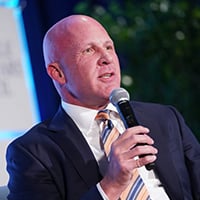Last week the Nashville Health Care Council and Nashville Capital Network hosted “Developing Health Care Ventures: Investor and Entrepreneur Collaborations,” an annual event featuring veteran health care entrepreneurs and investors. Council members and NCN partners attended the event at the Westin Nashville for insight from entrepreneurs and investors who are working together to solve care delivery issues. This event marked the Council’s first in-person panel discussion since the COVID-19 pandemic began.
The panel included Annie Lamont, co-founder and managing partner, Oak HC/FT; Ben Leedle, president and CEO, Blue Zones (a subsidiary of Adventist Health); G.B. Pratt, founder and CEO, ModifyHealth; and Brad Smith, CEO, Main Street Health. The discussion was moderated by Leigh Walton, senior partner, Bass, Berry & Sims.
View event photos on Flickr.
Photo credit: (c) 2021, Donn Jones
Panelists discussed how the pandemic has shifted their business plans and investment strategies over the last 18 months, offered guidance on evaluating an investment opportunity and its risk, and forecasted which health care industry sectors will be the most appealing for future ventures.
Nashville Capital Network Executive Director Sid Chambless introduced the panel with a brief update on venture capital activity in the Nashville market. As expected, 2020 saw a decrease in transactions and amount invested with 40 local transactions and $300 million invested. Investment activity in 2021 has “rebounded spectacularly,” Chambless said, led by high-profile investments such as Main Street Health, Monogram Health and others. So far this year there have been 30 transactions worth approximately $350 million and Chambless predicts continued strong investment activity.
In response to Walton’s opening question about the impact of COVID-19 on venture capital activity and entrepreneurial projects, Pratt described how ModifyHealth, an organization aimed at helping patients treat chronic conditions with nutrition therapy, fundraised via Zoom and acquired the “perfect partner.”
“I would guess we were one of the first companies to raise capital in a fully virtual way. Any investment requires close relationships and trust, and you can build it over Zoom if you’re diligent, have frequent meetings, and leverage your network,” Pratt said. “The bigger thing we learned is the conditions can change all around you but if you have a service that fills a need, you’ll grow through it.” Pratt explained that as physicians paused elective office visits and no longer referred to ModifyHealth, the organization lost more than half of its business. To overcome that obstacle, ModifyHealth shifted to marketing directly to patients, and its growth accelerated throughout the pandemic.
Leedle, an investor in ModifyHealth, expanded on the investor perspective and becoming comfortable with a virtual investment process. He recommended examining opportunities through three specific filters:
- Mission fit: understanding the management team, core values, and the alignment of those values to the company’s work and business
- Strategy fit: analyzing the business model and goals
- Performance fit: reviewing the team’s experience and how they have performed previously
Walton guided the conversation to risk profile analysis during the investment process. Lamont and Smith shared their experiences working together on Aspire Health, a network of palliative care practices, and Main Street Health, an organization creating value-based health care solutions for rural America.
“In all of these companies, you have to figure out the delivery model and the financing model. What’s been interesting with both Aspire and Main Street is that the market had one but not the other,” Smith said. “By going into spaces where one of the two is figured out, you decrease your risk a lot.”
“We’ve been an advocate and investor in primary care for a long time. Taking risk with primary care is something we’re serious and passionate about and is a way to solve the downstream health care problems of cost and access,” Lamont said. “We see 10 companies for every idea now, and so many knockoffs. [What we’re doing with Main Street Health] is unique and hard, but the right model for this particular sector.”
To close the discussion, an audience question surveyed the panel on health care industry sectors of interest for upcoming venture capital activity. Lamont said mental health has been neglected and resulted in many startups over the last year and a half, but there is a “huge runway there” for continued progress. She added that “anywhere you look, there is an opportunity to fix something in health care.”
“The big beast for health care is our environment, where we live,” Leedle said. “At Adventist, we’ve concluded that all the love we pour into patient care is significantly diluted if we don’t make the same investment in the communities we serve. I think there will be growing awareness and subsequent action over the next five years that if we want the very best outcomes, we absolutely have to have great clinical care, hospitals, doctors, extended services and technology, but we also have to shape the environments where we spend our time. This means we have to transform our communities in a manner that makes healthy choices, that improve well-being, easy and accessible for all.”
The Nashville Health Care Council will continue to offer relevant in-person and virtual events during the COVID-19 pandemic. Hayley Hovious, Council president, said, “We’re all learning how to live with COVID-19 and the Council is committed to doing everything we can to ensure our events are in person as much as possible and our guests feel safe and comfortable while they’re here.”
